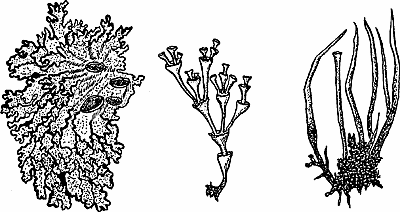Illustration of lichen

- lichen 1
Note: The main body of the lichen, known as the thallus, is formed by fungal filaments which surround the photosynthetic algal or cyanobacterial cells. The lichen is usually described as having a leaflike (foliose), crusty (crustose), or branching shrub-like (fruticose) form. Lichens often play an important part in the weathering of rocks and include some that are sources of natural dyes.
Share